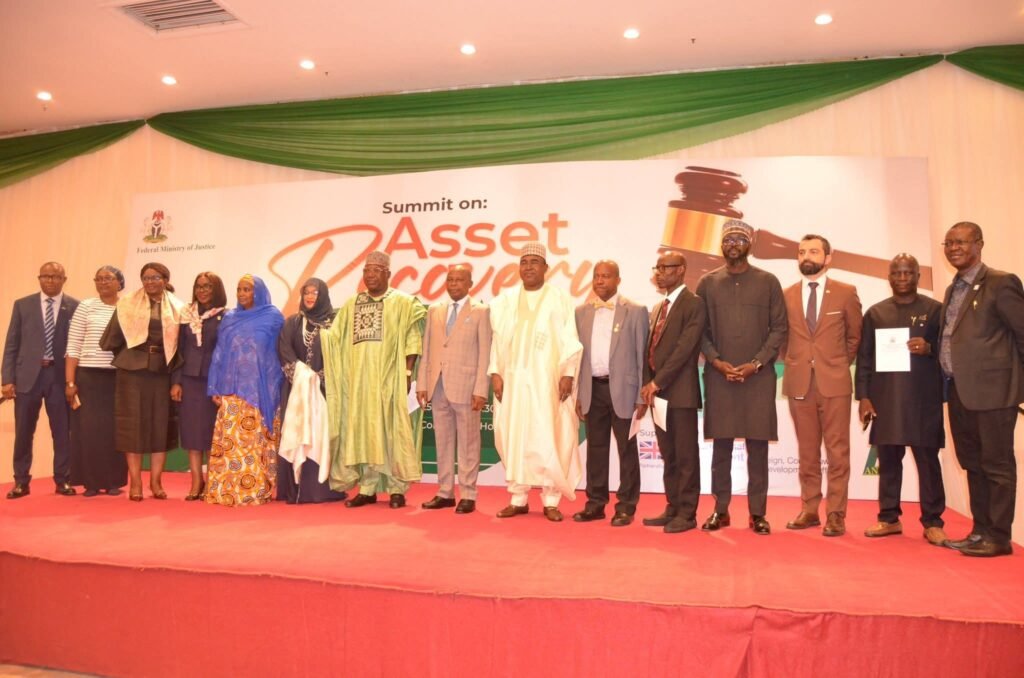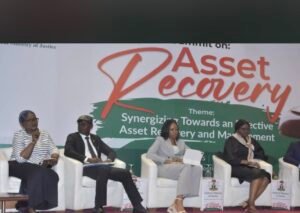
Abuja, Nigeria – May 27, 2025 —The African Center for Governance, Asset Recovery, and Sustainable Development has reaffirmed its commitment to strengthening Nigeria’s asset recovery regime through active participation in a high-level Asset Recovery Summit held in Abuja. The event was convened in collaboration with the Federal Ministry of Justice and supported by the UK Foreign, Commonwealth & Development Office (FCDO).
The Summit, themed “Synergizing Towards Effective Asset Recovery and Management,” brought together key stakeholders, including senior representatives from the Economic and Financial Crimes Commission (EFCC), Independent Corrupt Practices and Other Related Offences Commission (ICPC), National Drug Law Enforcement Agency (NDLEA), Nigerian Financial Intelligence Unit (NFIU), and the Technical Unit on Governance and Anti-Corruption Reforms (TUGAR). Additionally, in attendance were officials from the embassies of the United States, Switzerland, and France, the United Nations Office on Drugs and Crime (UNODC), and the International IDEA/ROLAC program.
President Bola Ahmed Tinubu, represented by the Permanent Secretary for Political and Economic Affairs, Engr. Nadungu Gagare — reiterated the administration’s unwavering commitment to the fight against corruption. In his keynote address, the President unveiled the National Central Database of Forfeited Assets alongside the Proceeds of Crime (Standardized Automated Asset Forfeiture Management System) Regulations 2024.
Attorney-General of the Federation and Minister of Justice, Prince Lateef O. Fagbemi, SAN, emphasized in his opening remarks that asset recovery remains a central strategy in combating corruption and illicit financial flows in Nigeria and that “Asset recovery is a fundamental pillar in our strategy to address corruption, economic crimes, and illicit financial flows, which undermine our national development. The Federal Government has remained resolute in its pursuit of transparency, accountability, and adherence to the rule of law in the management of recovered assets,” He further explained that the newly launched database will require all relevant organizations to submit monthly records of forfeited assets, enhancing oversight and promoting transparency.


A major highlight of the Summit was the unveiling of two key guidance documents — the Asset Recovery and Management Manual and the Special Procedure Operation Manual — jointly developed by the African Center for Governance, Asset Recovery, and Sustainable Development and the Asset Recovery and Management Unit of the Federal Ministry of Justice. These resources aim to streamline the implementation of the Proceeds of Crime Act (POCA) 2022, providing law enforcement agencies and practitioners with practical tools for efficient asset tracing, recovery, and management.
The summit featured technical plenaries and panel discussions moderated by Juliet Ibekaku-Nwagwu, Executive Director of the African Center, with panelists drawn from government agencies including EFCC, ICPC, NDLEA, Nigerian Police, and the Nigerian Customs Service. Discussions reviewed progress and challenges in implementing POCA and explored international cooperation in the confiscation and return of illicit assets. A second session, also moderated by Mrs. Ibekaku-Nwagwu, focused on accelerating asset return procedures in line with the UN Convention Against Corruption and Sustainable Development Goal 16.4. Participants included representatives from the Ministry of Foreign Affairs, UNODC/STAR Initiative, and civil society organizations such as ANEEJ and CLEEN Foundation.
A strategic panel discussion titled “Asset Forfeiture Proceedings and the Role of the Judiciary in Enforcing the Rule of Law” was moderated by Professor M.T. Ladan, Phd. Former Director-General of the Nigerian Institute of Advanced Legal Studies (NIALS). The panel featured distinguished speakers including Hon. Justice M.L. Shuaibu, JCA; Hon. Justice A.O. Faji; and Emmanuel A. Akomaye, MFR. The session emphasized the judiciary’s role in implementing Nigeria’s Proceeds of Crime Act (POCA) 2022, which addresses the shortcomings of previous fragmented asset recovery laws. POCA’s shift in strategy targets illicit proceeds, disrupting criminal operations by depriving them of financial resources. The judiciary plays a vital role in issuing orders to prevent suspects from hiding or dissipating assets, while civil forfeiture provisions enable action without criminal conviction.
In conclusion, the session recommended targeted capacity building and training for members of the judiciary on the provisions of the Proceeds of Crime Act (POCA) 2022. It also emphasized the need to deepen inter-agency collaboration for effective implementation of the Act, strengthen institutional commitments, and enhance stakeholder cooperation to uphold the rule of law in asset recovery processes.
Key takeaways from the Summit included the necessity of robust inter-agency collaboration, the establishment of efficient information-sharing systems, and the reinforcement of international partnerships to ensure the return of stolen assets to victim countries.
The event served as a pivotal platform to advance transparency, strengthen legal frameworks, and foster sustainable development through effective asset recovery mechanisms in Nigeria. As Nigeria continues to grapple with the complex challenges of asset recovery, participants at the summit collectively agreed that the launch of the National Central Database marks a pivotal shift toward systemic transparency and public accountability. The platform is expected to significantly enhance public trust, improve coordination among agencies, and deter future illicit financial flows.


